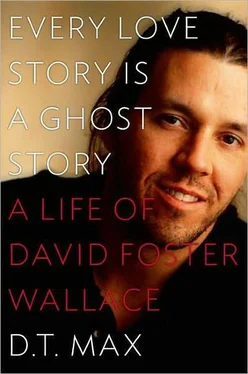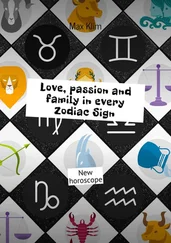Wallace’s parents took their son in and put him back in his bedroom on the second floor. After his difficult senior year in high school, they could hardly have been surprised by such an outcome, but if they felt this, they did not say it. They were not unfamiliar with suicidal depression: Sally’s sister and uncle had both taken their own lives. The family let Wallace come and go as he pleased. “We didn’t press him,” his mother says. “We figured if he wanted to talk about it he’d talk about it.” But he began to confide in his sister, Amy, whom up until then he had mostly looked on as a nuisance. He told her how frightened and uncomfortable the world felt to him and how nothing seemed meaningful anymore. He wondered who he really was — the star Amherst student or a young man who would never make it out of the home on his own? — and his sister quietly worried the same thing. Yet over time he began to heal, and by the spring he got a job driving a school bus. It was good to be back in the Midwest, experiencing the comforting flatness of the prairie. But when the kids mouthed off at him, he quit, left the bus behind, and walked home. In semi-mock outrage, he wrote Costello how appalled he was that Urbana would permit someone with a known history of mental disease to handle a motor vehicle with children on board. Never liking the phone, he instead established a lively correspondence with Costello, who was kept informed of his travails.
He also wrote some fiction. Wallace had written occasional comic stories in high school but any interest had dropped away when he got to Amherst. 3Fiction on campus was the province of, as he would later describe them, “foppish aesthetes” who “went around in berets stroking their chins.” They were sensitive, and his sensitivity was not something he wanted to emphasize. The cast of mind he thought it took to be a writer was scary to him. But home on his own he gave it another try. One story he worked on, according to Costello, was called “The Clang Birds,” about a fictional bird that flies in ever decreasing circles until it disappears up its own ass. In Wallace’s story, God ran an existential game show where contestants were asked impossible or paradoxical questions. God wielded the buzzer and no one could stop playing. He also tried writing in a more delicate vein. He started a prose poem about the cornfields of Illinois, which he sent to Costello to read, and also a story about a pretty girl whose drunk boyfriend kills her in a car crash. There may have been bigger efforts — certainly he conceived his goals ambitiously. Costello remembers getting a letter from Wallace announcing that he wanted to write fiction that would still be read “100 years from now.” He was impressed — he had no inkling either that his roommate wanted to write or could write fiction. 4
There had been problems in the Wallace parents’ marriage for some time. In early summer Sally Wallace discussed them with her daughter and told her she was moving out. She asked Amy to tell David in turn. The blow to her son was enormous. He refused to visit her in her new home. Her brother, Amy realized, “felt personally betrayed. He really thought that in a family everybody is expected to tell the truth by word or by deed.” Years later, he would write a girlfriend that what had devastated him about the moment was his mother’s “not trusting me with reality, fearing it would pain me.” Yet at the time these events did not derail Wallace’s recovery. The relationship between event and crisis for Wallace was not always a direct one. It may have helped cushion the blow that as the summer wore on, he started hanging out with Susie Perkins. Perkins was now a psychology major at Indiana University. They became involved. Wallace was deeply drawn to her, seeking a caregiver to replace his mother. To Costello, her affect toward his friend reminded him of a girl looking after a wounded bird.
Wallace came back to Amherst in the fall of 1982. He was extremely embarrassed: the myth of his capability had been shattered. He was elusive about what had happened — among his close friends only Costello knew the truth. The two friends had agreed to live together again, adding Nat Larson to their group. Just before the start of school, they went on a camping trip to Maine and Nova Scotia. “We stuffed ourselves with fresh seafood from buffets and lay around on the beach,” remembers Fred Brooke, who also went along. For Wallace, all-male dynamics were often the most comfortable, but he was also so agitated by the bugs, he chose to sleep in the car. The rest were amused by the slapping noises they heard through the night, though to Costello, who knew him best, Wallace’s behavior was as frightening as it was funny. He knew that Wallace when he was under stress or fragile acted out his full complement of phobias.
In the housing lottery the group was awarded a room in Stone, one of the “social dorms,” as they were called. The social dorms were designed with bedrooms radiating off a common room and were much more pleasant than the rooms in Stearns or Moore. Wallace, his friends noticed, looked different now. He no longer wore the generic clothes — the corduroys and White Sox and Bears T-shirts of the Midwest — choosing instead worn thrift-shop T-shirts and torn shorts, often with his beloved hoodie. He liked untied Timberland boots and double socks. The sartorial change was representative of an interior one. He was beginning to distance himself from the culture of the Midwest that had formed him, where one could be radical but never rude. Adopting the “dirt bomb” look, as it was called, was one small way of saying he was done trying to be Joe College. His inchoate political hopes were gone too. “No one’s going to vote for someone who’s been in a nuthouse,” he told Costello, and mentioned Thomas Eagleton, the senator and Amherst graduate who had briefly been a vice presidential candidate before the news that he’d had electroconvulsive therapy for depression forced him to withdraw in 1972.
Wallace took no chances with his classes on his return. His first semester back he enrolled in logic, Christian ethics, and ancient and medieval philosophy with Kennick. The only nonphilosophy course he took was French, which was necessary if he wanted to get a degree in the department. He aced all four classes, taking particular pleasure in logic. The course description promised to cover “the categorical, hypothetical, alternative and subjunctive syllogism,” as well as the “concepts of consistency, completeness and decidability.” In logic, you were either right or you were wrong, and the things that could keep you from always being right — lassitude, sloppy thinking — with Wallace’s enormous focus he could always overcome. He would later talk about the “special sort of buzz” logic gave him, how after “a gorgeously simple solution to a problem you suddenly see after half a notebook with gnarly attempted solutions,” you almost heard a “click.” In no time he was a self-described “hard-core syntax wienie.”
Wallace’s father thought little of the discipline, objecting that logicians tended to replace important questions — free will, beauty — with technical discussions about the language behind those questions, but this was work of the sort that made Wallace’s mind hum. It replaced the ambiguity of actual life with clarity. And as he would later tell an interviewer, highly abstract philosophy gave Wallace both the pleasure of being in his father’s field with the “required thumbing-the-nose-at-the-father thing.” (Another interpretation is that he was still trying to please both parents — grammar is another logical system, after all.)
Kennick’s ancient and medieval philosophy was a class that gave Wallace pleasure for a different reason. His father had taken the course some thirty years before, and much as he wanted to escape his father’s shadow, he also wanted to be protected by it. The ancients were part one of Kennick’s three-part introduction to the field he loved. Kennick required a paper every two weeks. The student was supposed to encounter the material fresh, using only original research and thinking, without consulting secondary sources. “I want you to be writers of prose, not processors of words,” Kennick would explain. Wallace met this rigorous timetable with a routine of his own. He would write a draft, then revise it twice longhand, then revise that revision twice on his Smith-Corona, pecking away with two fingers.
Читать дальше












